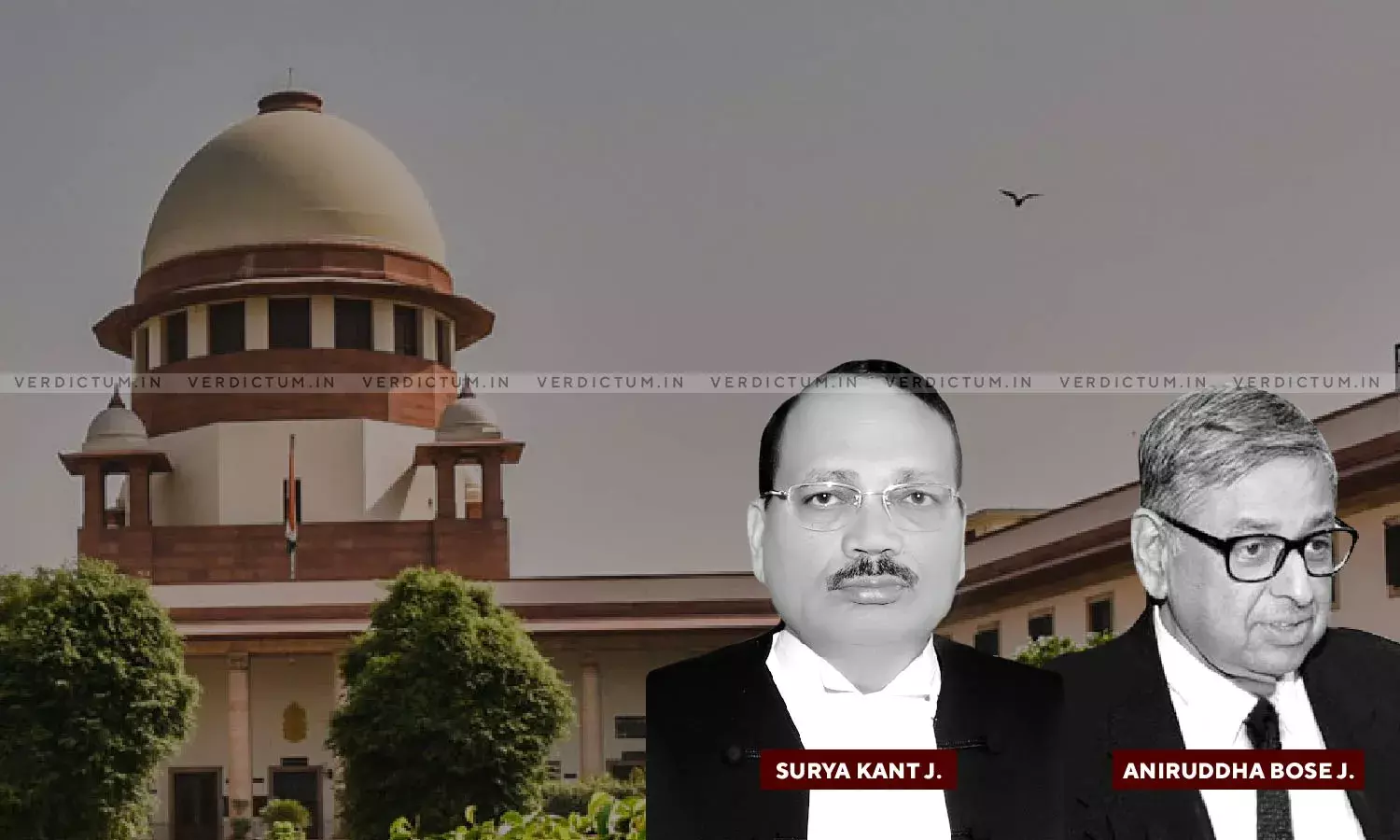Motor Accident Claim- Compensation A Fulcrum To Bring Equality Between Wrongdoer & Victim When Equality Disturbed By Wrongdoer: SC

While dealing with a case involving motor accident claim, the Supreme Court has observed that the compensation under Motor Vehicles Act 1988 acts as a fulcrum to bring equality between the wrongdoer and the victim, whenever the equality gets disturbed by the wrongdoer's harm to the victim.
The bench of Justice Surya Kant and Justice Aniruddha Bose observed thus "While determining compensation under the Act, section 168 of the Act makes it imperative to grant compensation that appears to be just. The Act being a social welfare legislation operates through economic conception in the form of compensation, which renders way to corrective justice. Compensation acts as a fulcrum to bring equality between the wrongdoer and the victim, whenever the equality gets disturbed by the wrongdoer's harm to the victim."
The Bench was hearing an appeal against a Judgment passed by the Kerala High Court.
Quashing the judgment, the Apex Court observed that "We grant Rs. 27,95,520/ as the total 'loss of dependency' on account of the income of the Deceased being calculated at Rs. 15,600/ i.e. Rs.1,87,200/ per annum. Upon adding the remaining amount granted by the High Court under different heads, the total compensation granted to the Appellant comes to Rs. 29,73,520/ (Rs.27,95,520/ + Rs. 1,78,000/). The Insurance Company is directed to pay the enhanced compensation amount of Rs. 29,73,520/ to the Appellants along with interest at the rate of 9% per annum from the date of filing of the claim petition till the date of realisation. The aforesaid amount shall be apportioned among the Appellants in the ratio fixed by the Tribunal in the award."
Senior Counsel Thomas P Joseph appeared on behalf of the Appellants and Advocate Rameshwar Prasad Goyal represented the Insurance Company.
In this case, the Deceased met with a fatal car accident while riding his motorcycle. The offending car was insured by the Respondent Insurance Company and was allegedly being driven in a rash and negligent manner. The Deceased succumbed to his injuries on the way to the hospital.
The Appellants (family of the Deceased) approached the Motor Vehicle Accidents Claims Tribunal, and preferred a claim petition under Section 166 of the Motor Vehicles Act, 1988. The Appellants sought compensation of Rs. 64,15,000 with interest. The Tribunal observed that the Deceased was a skilled labourer and fixed the total compensation at Rs. 32,39,000/ and awarded interest at the rate of 9% per annum from the date of filing of petition till the realisation of awarded compensation.
The Insurance Company filed an appeal before the High Court challenging the quantum of compensation. The High Court scaled down the compensation granted by the Tribunal to Rs. 19,70,000/¬-.
Aggrieved Appellants approached the Supreme Court.
The Supreme Court found that there existed sufficient evidence to show that the Deceased was a fish vendor-cum-driver with a valid license.
Referring to Schedule B-Category III of the Kerala Fair Wages Act, the Court confirmed that a driver is classified as a "skilled worker". In that context, the Supreme Court said that "Reading this in conjunction with the Notification that came into effect from 01.01.2015 which amended Schedule A of the Kerala Fair Wages Act, prescribing a minimum pay scale of the workers listed in Schedule B, it is apparent that a 'driver' in Kerala earned a minimum of Rs. 15,600/ in 2015. It appears to us that the aforesaid Act and the notification issued thereunder were not brought to the notice of the Tribunal or the High Court. As a result thereto, the High Court could not be cognizant of the statutory mandate prescribing minimum wages for a skilled worker like 'driver', and thus, erred in fixing the income of the Deceased".
The Court did not find any valid reasons to include the rental income that the Deceased was drawing from leasing out a room, as the rental income could be simply transferred to his legal heirs.
Further, calculating the compensation for loss of dependency, the Court observed that "The final notional income of the Deceased must thus be fixed at Rs.15,600 / (Rs. 1,87,200/ per annum). Since the Deceased was of 32 years old at the time of his death, the multiplier applicable in the instant case would be 16, and 40% of increase for future prospects deserves to be added as the Deceased was selfemployed. Onethird of the Deceased's income would be deducted towards his personal expense as he had three dependents. Hence, the compensation payable to the Appellants under the head of loss of dependency would amount to Rs.27,95,520/ (Rs. 15,600 x 140/100 x 12 x 16 x 2/3)."
Therefore, the Supreme Court directed the insurance company to pay the enhanced compensation amount of Rs. 29,73,520/ to the Appellants along with interest at the rate of 9% per annum from the date of filing of the claim petition till the date of realisation.
Accordingly, the Judgment passed by the High Court was set aside.
Cause Title: Manusha Sreekumar & Ors. v. The United India Insurance Co. Ltd.
Click here to read/download the Judgment

